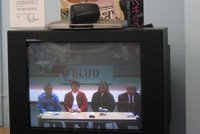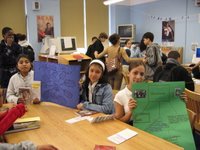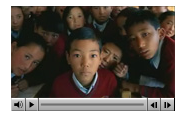
In honor of November 12-18 being National Hunger and Homelessness Awareness Week, one of our 8th grade classes had the opportunity to participate in an "ASK Program" through the Berrien County ISD. Before the videoconference all the participating students read the book "Monkey Island" by Paula Fox. "Monkey Island" tells the story of an 11 year old boy that finds himself abandoned and homeless in New York City. ASK which stands for Authors Specialist Knowledge provides students with an opportunity to ask either the author or as in this case specialists questions about the issues, characters and events, the book raises in the student's mind. Through this videoconference the students are able to use higher level thinking skills to dig deeper into the subject matter.

Yesterday's program involved three schools, (two in Michigan and one in New York), and four specialists who work with the homeless in Berrien County, Michigan. It is a wonderful format. The students get to ask the experts questions. The four specialists seemed to really enjoy seeing the students and hearing their well thought out questions. It's interesting that asking questions takes on new meaning when used in an ASK videoconference.

The students work hard to prepare for the program. They journal as they read the chapters in the book.
In the case of our 8th grade class in New York, the students also participated in other activities. They did story mapping, character studies, graphic organizers on homelessness, filmstrips, and even one group studied the law as it relates to child abandonment.

After the videoconference the students reflected on what they had learned. One boy said "I always thought the homeless were just bums but now I know that's not true". The students had learned they are mothers and their children, the unemployed and even veterans. The students were encouraged by the 4 specialists to stay in school and get a higher education. This is because one of the main causes of homelessness is lack of skills to get a good paying job. A lot of credit must go to the classroom teacher for preparing their students to ASK the questions and of course to the specialists for giving so many good anwers. Happy Thanksgiving!





